A beautiful garden, no matter what the size starts with the right soil, and you need the right type of soil for what you're planting. Plants, and vegetables in particular, can grow in a variety of soils but to get the best out of your efforts and the plants themselves, the soil should offer your vegetable garden all the right stuff. Read on to find the best potting soil for vegetables.
Nutrient levels, aeration, moisture retention, and drainage, are all components of good potting soil. But all potting soils are not created equal.
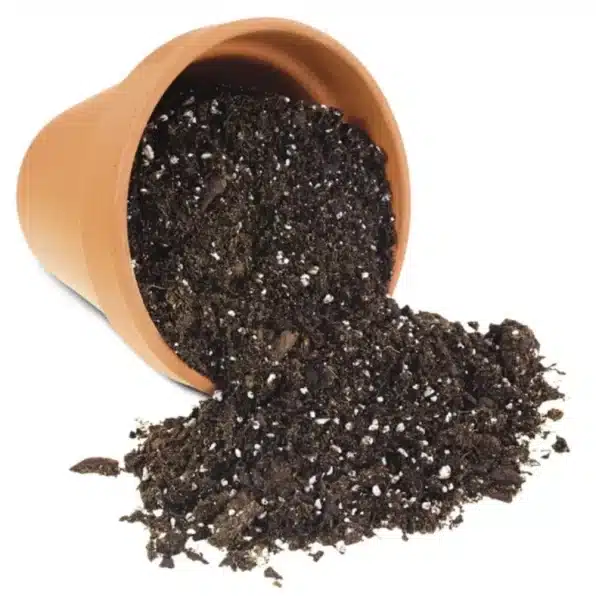
What is Potting Soil?
Potting soil, also known as potting mix, is a mixture of materials that is used to grow plants in containers. It is typically made up of organic materials such as peat moss, perlite, and vermiculite. Potting soil provides plants with the nutrients, drainage, and aeration they need to grow healthy and strong.
There are many different types of potting soil available, with assorted mixtures and combinations, each designed for a specific purpose. Some potting soils are designed for general use, while others are specifically designed for certain types of plants.
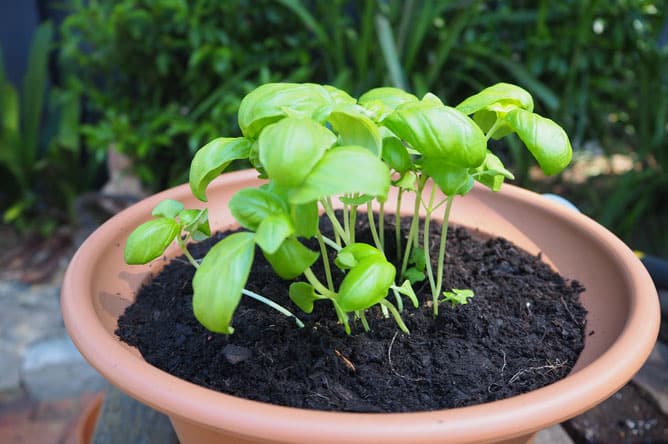
Let's look at some of the differences and how to choose the best soil for what you are planting.
Is Potting Soil Different from Garden Soil?
Potting soil and garden soil are two different types of soil that are used for different purposes. Potting soil is a lightweight, sterile growing medium that is designed to provide plants with the nutrients and drainage they need to grow in containers.
Garden soil is typically made from a combination of topsoil, compost, and other organic materials. It is designed to improve the drainage, aeration, and nutrient content of native soil.
What to Consider When Choosing the Best Soil for a Vegetable Garden
- Drainage: Vegetables need well-draining soil so that their roots don't rot. If your soil is too clay-ey, it will hold too much water and your plants will suffer. If your soil is too sandy, it will drain too quickly and your plants won't be able to get enough water.
- Nutrient content: Vegetables need nutrients to grow strong and healthy. If your soil is nutrient-poor, you may need to add compost or other organic matter to improve its fertility.
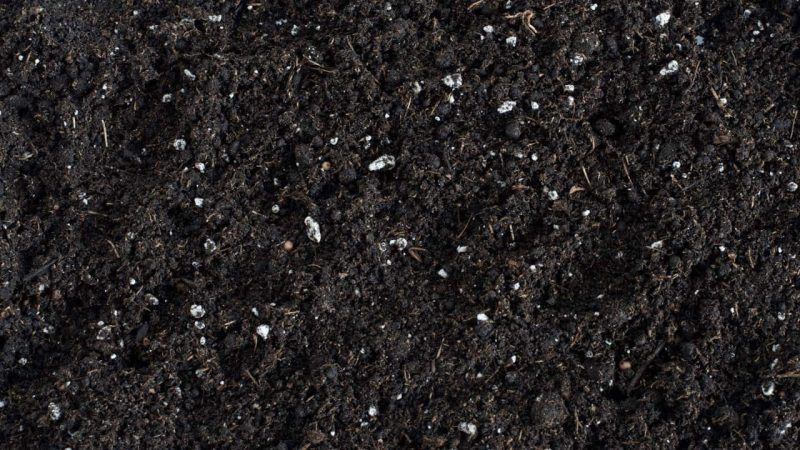
- pH level: The pH level of soil affects the availability of nutrients to plants. Most vegetables prefer slightly acidic soil (pH of 6.0-6.8). If your soil is too alkaline or too acidic, you may need to add lime or sulfur to adjust the pH level.
- Texture: The texture of soil refers to the size of the particles that make it up. Vegetables prefer loamy soil, which is a mix of sand, silt, and clay. Loamy soil is well-draining and has good water-holding capacity.
Common Ingredients in Potting Soil for Vegetables
Peat Moss
Peat moss is a partially decayed organic matter that is formed from the accumulation of dead sphagnum moss in wetlands.
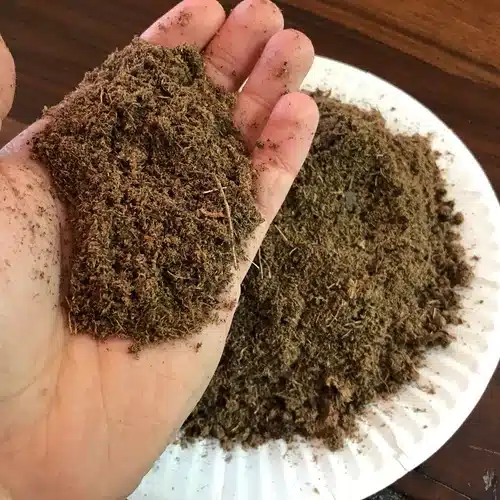
Here are some of the benefits of using peat moss:
- Water retention: Peat moss is a very good water retainer, which can help to keep plants moist during dry periods.
- Drainage: Peat moss also helps to improve drainage, which can help to prevent root rot and other problems.
- Aeration: Peat moss is light and airy, which helps to provide oxygen to plant roots.
- Nutrients: Peat moss is a good source of some nutrients, such as nitrogen, phosphorus, and potassium.
- pH: Peat moss is slightly acidic, which can help to balance the pH of soil.
Side Note: Peat moss is a non-renewable resource and its harvesting can have a negative impact on the environment. It is important to use peat moss sparingly and to consider alternatives, such as compost or worm castings, whenever possible. Coconut coir, also known as coco peat or coir peat, is the best-known alternative to peat moss.
Perlite
Perlite is a naturally occurring volcanic glass that has been heated to a high temperature to create lightweight, porous granules. It is often used in potting mixes, hydroponics, and other horticultural applications.
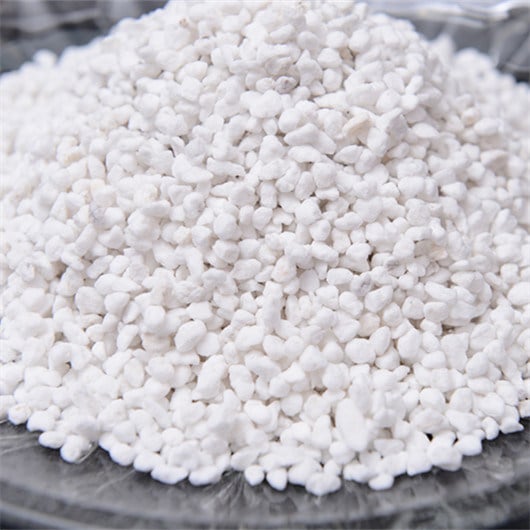
Perlite has a number of beneficial properties for plants, including:
- Improved drainage: Perlite helps to improve drainage by allowing water and air to flow freely through the soil. This can help to prevent root rot and other problems caused by waterlogged soil.
- Increased aeration: Perlite helps to increase aeration by providing spaces for air to flow through the soil. This can help to improve the overall health of plant roots.
- Lightweight: Perlite is lightweight, which makes it easy to handle and transport. It is also less likely to compact than other soil amendments, such as peat moss.
- Non-toxic: Perlite is non-toxic and inert, which means that it will not harm plants or animals.
- Inexpensive: Perlite is an inexpensive soil amendment that is widely available.
Vermiculite
Vermiculite is a naturally occurring mineral that is mined from the earth. It is a hydrous phyllosilicate, which means that it contains water molecules between its layers. When vermiculite is heated, it expands and forms a lightweight, porous material.
Vermiculite is often used in potting mixes and as a soil amendment. It helps to improve drainage, aeration, and water retention in the soil. Vermiculite is also sterile, which means that it does not contain any harmful bacteria or fungi.
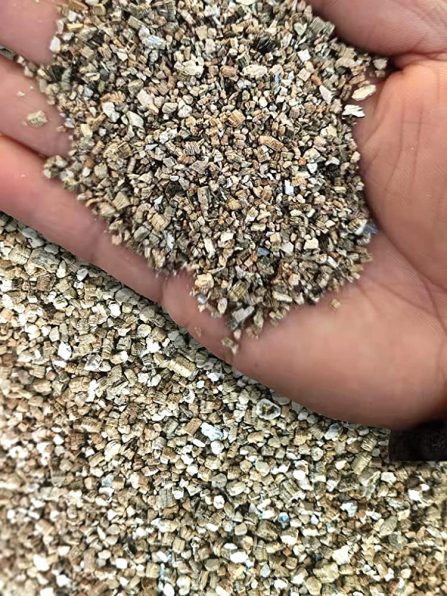
Here are some of the benefits of using vermiculite:
- Improved drainage: Vermiculite helps to improve drainage by allowing water and air to flow freely through the soil. This can help to prevent root rot and other problems caused by waterlogged soil.
- Increased aeration: Vermiculite helps to increase aeration by providing spaces for air to flow through the soil. This can help to improve the overall health of plant roots.
- Water retention: Vermiculite helps to retain water, which can help to keep plants moist during dry periods.
- Sterile: Vermiculite is sterile, which means that it does not contain any harmful bacteria or fungi.
- Inexpensive: Vermiculite is an inexpensive soil amendment that is widely available.
Vermiculite is a versatile and beneficial soil amendment that can be used to improve the health and growth of plants.
Our Best Soil for Vegetable Garden Recommendations
There are many key factors that contribute to the quality of garden soil, including:
Drainage: Garden soil should drain well to prevent waterlogging and root rot.
Aeration: Garden soil should be aerated to allow oxygen to reach the roots of plants.
Nutrient content: Garden soil should contain the nutrients that plants need to grow, such as nitrogen, phosphorus, and potassium.
pH level: The pH level of garden soil should be within the range that is ideal for the plants you are growing.
Organic matter: Garden soil should contain organic matter, such as compost, to improve its fertility and drainage.
Bacteria and fungi: Garden soil should contain a healthy population of bacteria and fungi, which help to break down organic matter and make nutrients available to plants.
So if you want to dive deep into what is in your soil or potting mix you can dial in a perfect soil, or you can try one of the many ready-made soils formulated and bagged for you. Let's look at what makes them part of our best soils for vegetable gardens list.
- Espoma Organic Potting Mix
- FoxFarm Ocean Forest Potting Soil
- Miracle-Gro Potting Mix
- Proven Winners Premium All Purpose Potting Soil
- Sun Gro Horticulture Black Gold All-Purpose Potting Soil
1. Espoma Organic Potting Mix
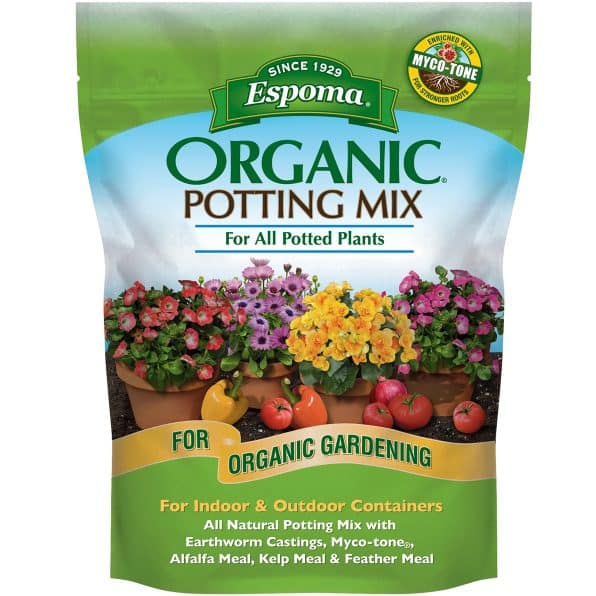
Key Ingredients & Nutrients:
- Sphagnum peat moss
- Humus
- Perlite
- Earthworm castings
- Alfalfa meal
- Kelp meal
- Feather meal
What makes it a good soil for vegetables?
The “goodness” of the soil is in the ingredients.
Sphagnum peat moss is a lightweight, acidic material that helps to retain moisture and provide aeration. Humus is a source of organic matter, which helps to improve soil structure and drainage.
Perlite is a lightweight, porous material that helps to improve drainage and aeration. Earthworm castings are a natural fertilizer that provides a slow-release source of nutrients.
Alfalfa meal is a source of nitrogen, phosphorus, and potassium. Kelp meal is a source of trace minerals and macronutrients. Feather meal is a source of phosphorus and potassium.
| Pros: | Cons: |
|---|---|
| Contains Myco-Tone (fungi) | Can be expensive |
| Well-draining | Availability |
| Aerated | |
| Contains organic material | |
| Indoor and outdoor |
2. FoxFarm Ocean Forest Potting Soil
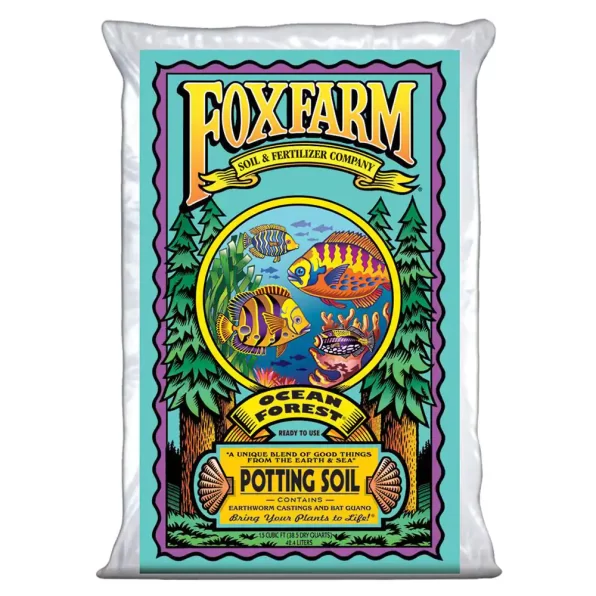
Key Ingredients & Nutrients:
- Aged forest products (humus)
- Sphagnum peat moss
- Earthworm castings
- Bat guano
- Fish emulsion
- Crab meal
What makes it a good soil for vegetables?
It’s a mix of organic matter, lightweight material, slow-release fertilizer, and a balanced source of nutrients. The soil is light and fluffy, which allows for good drainage and aeration. It is also rich in nutrients, which helps to promote healthy plant growth.
| Pros: | Cons: |
|---|---|
| Great for tomatoes | Price |
| All-in-one nutrient package | Possibility of larger chunks of wood |
| Aerated | Moisture retention is low |
3. Miracle-Gro Potting Mix
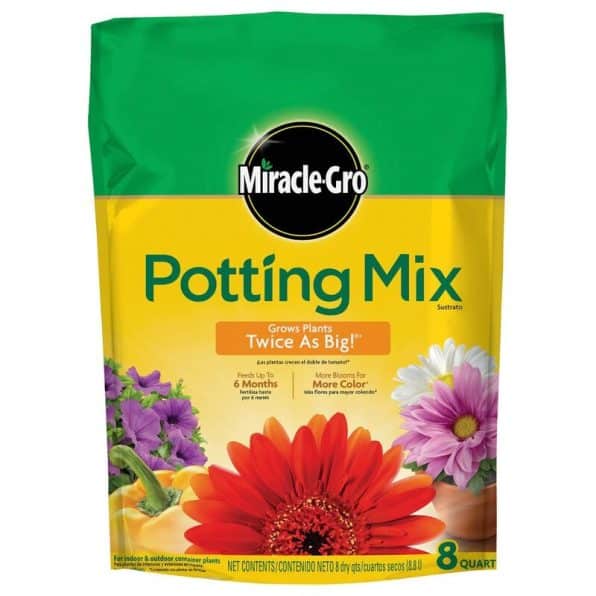
Key Ingredients & Nutrients:
- Processed forest products
- Sphagnum peat moss
- Peat
- Perlite
- Compost
- Fertilizer*
- Wetting Agent
* “Miracle-Gro's potting mix contains 0.21 percent ammonium nitrate, 0.07 percent ammonium, and calcium phosphates, and 0.14 percent potassium sulfate.”
What makes it a good soil for vegetables?
This potting mix is made with a blend of organic and inorganic materials. It is easy to use and provides a good balance of nutrients. The addition of fertilizers kicks the nutrient levels up and this helps to speed up the growing process.
| Pros: | Cons: |
|---|---|
| Price | Added fertilizers |
| Easy to use | |
| Availability | |
| Indoor or outdoor |
4. Proven Winners Premium All-Purpose Potting Soil
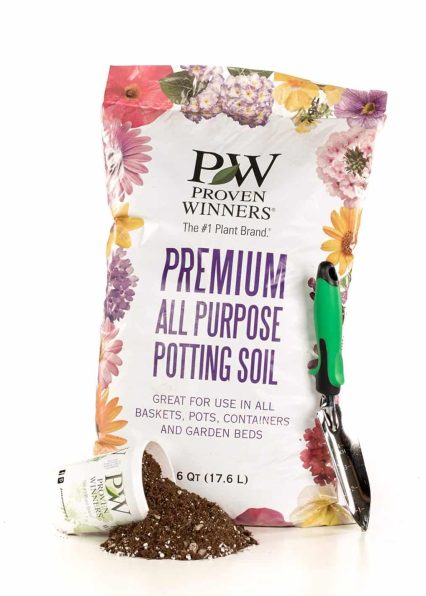
Key Ingredients & Nutrients:
- Composted bark
- Premium Canadian sphagnum peat moss
- Horticulture grade perlite
- Dolomite lime
- Proven Winners 15-7-15 + Minors Premium Continuous Release Plant Food
What makes it a good soil for vegetables?
This potting mix is made with a blend of organic and inorganic materials. It is well-draining and provides a good balance of nutrients. It contains a slow-release fertilizer to make nutrients available over a longer period of time.
| Pros: | Cons: |
|---|---|
| Well draining | Not recommended for starting seeds |
| Provides a good balance of nutrients |
5. Sun Gro Horticulture Black Gold All-Purpose Potting Soil
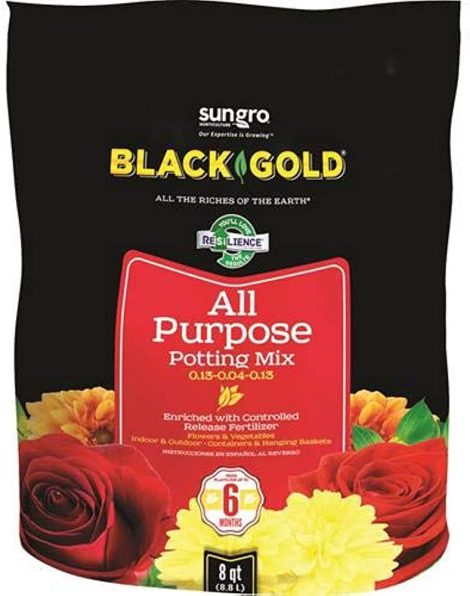
Key Ingredients & Nutrients:
- Canadian sphagnum peat moss
- Compost
- Perlite
- Earthworm castings
- Horticulture grade perlite, pumice, or cinder
- Processed bark
- RESiLIENCE® (Silicon)
What makes it a good soil for vegetables?
This mix is made up of organic materials consisting of peat moss, perlite and worm castings. It’s a well-draining nutrient rich soil that is well aerated. Another key ingredient that adds to the good soil quotient is the addition of silicon. Silicon helps to strengthen the plant and make it more disease and pest resistant, and aids in soil moisture retention and drainage.
| Pros: | Cons: |
|---|---|
| Well draining | Can be expensive |
| Nutrient-rich | May not be available in all stores |
| Aerated | Weed seeds and bug possibilities |
| Contains organic materials | |
| Indoors or outdoors |
Is Organic Potting Soil Better for a Vegetable Garden?
Yes, organic potting soil is better for a vegetable garden. Organic potting soil is made from natural materials, such as compost, worm castings, and peat moss. It is not treated with chemicals or pesticides, which makes it safe for use in gardens. Organic potting soil also helps to improve the quality of the soil, making it more fertile and productive.
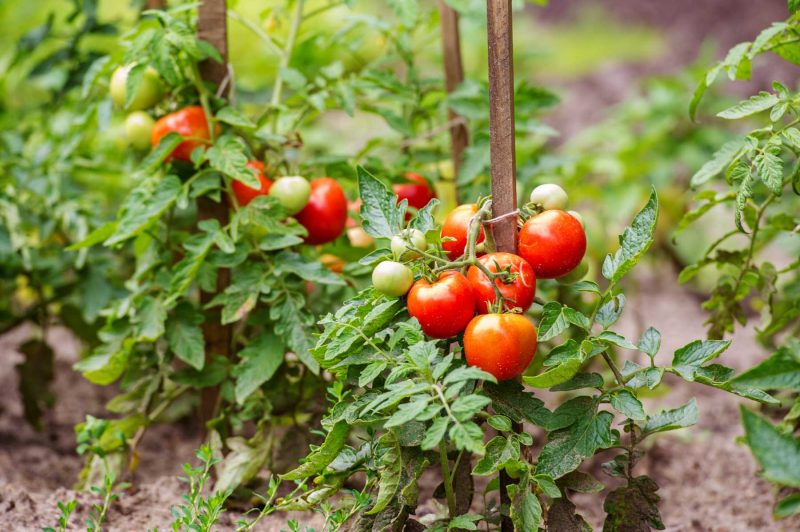
Here are some of the benefits of using organic potting soil in a vegetable garden:
- Improved soil quality: Organic potting soil helps to improve the quality of the soil by adding organic matter. Organic matter helps to improve the drainage, aeration, and water retention of the soil. It also helps to improve the fertility of the soil by providing nutrients to the plants.
- Reduced need for fertilizer: Organic potting soil releases nutrients slowly over time, which means that you may need to fertilize your plants less often. This can save you money and time.
- Better plant health: Plants grown in organic potting soil are generally healthier than plants grown in non-organic potting soil.
- Increased yields: Plants grown in organic potting soil often produce larger yields than plants grown in non-organic potting soil. This is because organic potting soil provides the plants with the nutrients they need to grow strong and healthy.
- Better taste: Vegetables grown in organic potting soil often have a better taste than vegetables grown in non-organic potting soil. This is because organic potting soil does not contain any chemicals or pesticides that can alter the taste of the vegetables.
There are some potential drawbacks to using organic potting soil in a vegetable garden. One drawback is that organic potting soil can be more expensive than non-organic potting soil. Another drawback is that organic potting soil can break down more quickly than non-organic potting soil, which means that you may need to replace it more often.
FAQ’S
What is potting soil?
The terms “potting soil” and “potting mix” are often used interchangeably, but there is a slight difference between the two. Potting soil is a mixture of soil, peat moss, perlite, and other materials that are designed to provide plants with the nutrients and drainage they need to grow in containers.
Are there benefits of using potting soil for vegetables?
Yes, there are benefits to using potting soil for vegetables. The light and fluffy soil make it easier for the vegetable's roots to establish and it keeps weeds to a minimum and allows for better drainage.
What ingredients are in potting soil for vegetables?
As an industry standard sphagnum peat moss, vermiculite, and perlite are used. Additional materials that add micro-nutrients are added along with different types of manure, bone meal, potash, and kelp.
Is potting soil different from garden soil?
Yes, potting soil is different from garden soil. Potting soil is a specially formulated mix of materials that is designed to provide the best possible growing environment for plants in pots or containers, while garden soil is generally thought of as an amendment to the native soil.

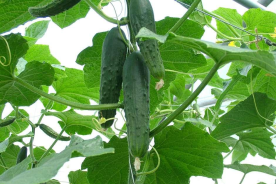
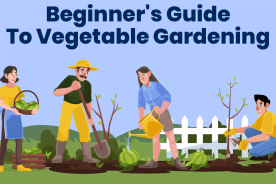
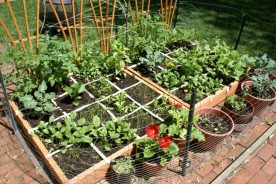

No Comments